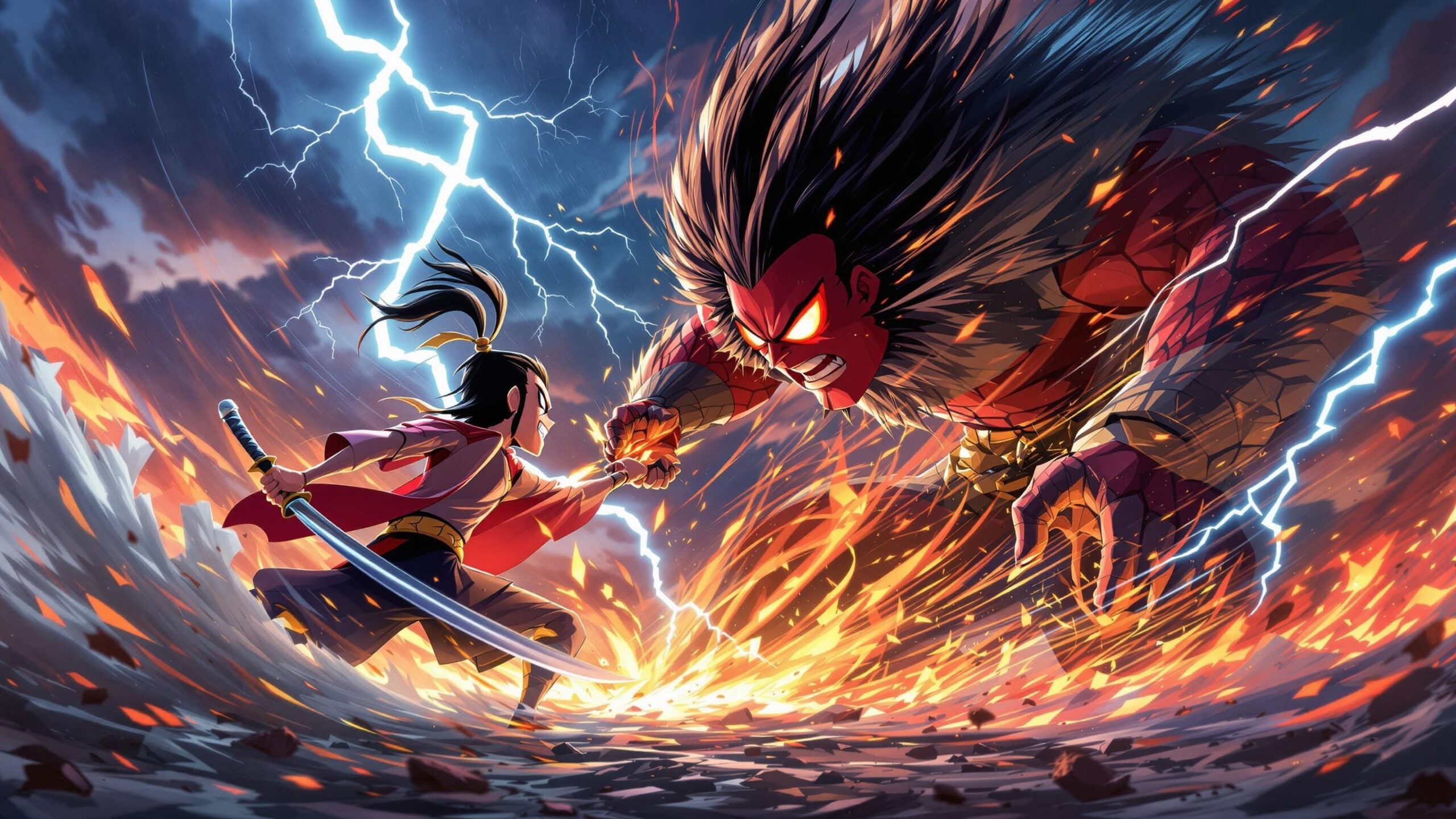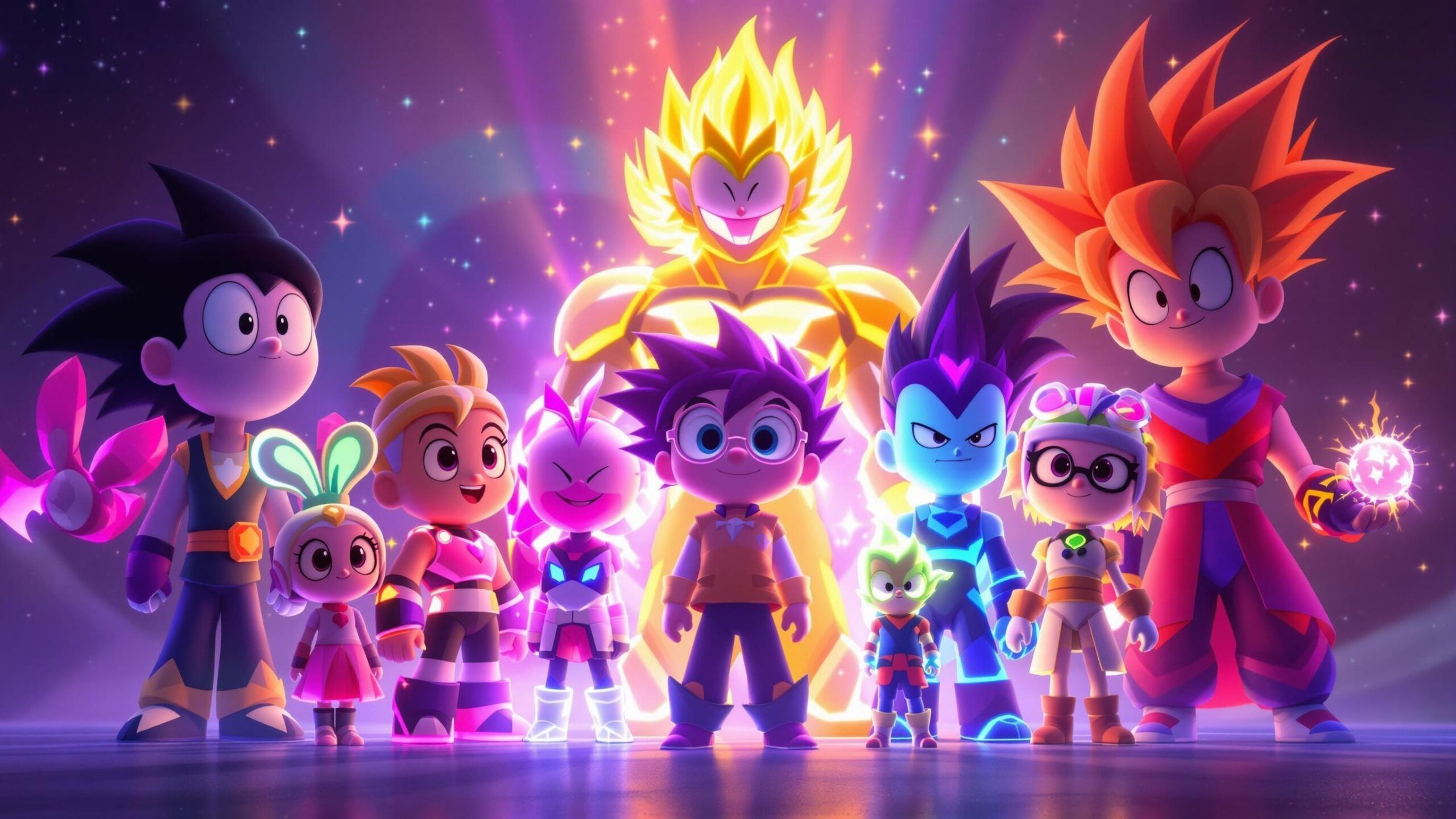In a world ravaged by evil, where the past and future collide, and where style and silence cut deeper than swords, there stood one warrior: Jack. Created by Genndy Tartakovsky, Samurai Jack was never just about flashy combat—it was an elegy of animation, a masterclass in mood, and an emotional journey soaked in steel and solitude. But that doesn’t mean it skipped on the action. If Jack’s tale is one of tragedy and resilience, it’s also one of unforgettable battles. Each clash wasn’t just about winning—they tested Jack’s soul, his beliefs, and sometimes, his very identity. From demon beasts to corrupted allies, every enemy pushed Jack closer to breaking… and yet, every time, he rose. Calm. Measured. Deadly. These aren’t just the coolest fights. These are the battles that defined the series. The ones that made us hold our breath. The ones we rewatched. The ones that told a story with every slash.
#1: The First Battle Against Aku
The first showdown between Samurai Jack and Aku isn’t just an epic action sequence—it’s the crucible in which Jack’s entire journey is forged. Split across the original three-part pilot, “The Beginning,” this battle establishes the show’s tone, stakes, and heart. It’s where Jack earns his name—and his destiny. We’re introduced to Jack as a young prince, whose peaceful kingdom is shattered when the demon Aku returns after centuries of slumber. Jack is sent into exile, where he trains under masters from every corner of the world—Spartans, monks, Egyptian scholars, Viking warriors—until he becomes a living weapon. By the time he returns home, he is a fully-formed samurai, armed with a mystical katana forged by gods. Jack’s confrontation with Aku begins with a stunning display of his skills as he slices through wave after wave of mechanical beetle drones. The animation here is pure poetry—fluid, striking, and punctuated by silence. Then comes the moment: Jack vs. Aku, the shape-shifting master of darkness. Aku transforms into monstrous forms—a flaming beast, a dragon, a giant—and Jack, with stoic resolve, meets each with calm precision. It’s chaos versus control. Darkness versus light. But just as Jack seems to gain the upper hand, Aku plays his trump card: a time portal. In an instant, Jack is hurled into the far future—a bizarre dystopia where Aku reigns supreme. The twist hits like a blade. Jack’s quest doesn’t end in victory. It begins with loss. This battle is more than swords and sorcery—it’s a philosophical war. Jack embodies discipline, honor, and tradition. Aku is entropy, mockery, and madness. Their clash sets the tone for the entire series. Even when Jack defeats Aku’s form, he can’t destroy his essence. The villain always returns. The fight is endless. What makes this fight so defining isn’t just its scale—it’s the weight it carries. Jack’s first battle isn’t his greatest triumph; it’s his greatest burden. From that moment on, he’s a man out of time, walking a lonely road with a sword and a purpose. The animation, the music, the tension—it all converges in this pivotal moment. Jack vs. Aku didn’t just kick off the series. It carved it into legend.
#2: The Battle with the Three Blind Archers
Few episodes capture the soul of Samurai Jack like “Jack and the Three Blind Archers.” It’s not just a fight—it’s a parable wrapped in precision. With minimal dialogue and breathtaking visuals, this battle reveals Jack at his most introspective, and his most quietly heroic. The story centers on a legendary tower said to house a magic well that grants any wish. For Jack, still desperate to return to the past, this seems like the miracle he’s been searching for. But there’s a catch: the well is guarded by three blind archers whose arrows never miss. They don’t speak, they don’t hesitate, and they seem utterly unbeatable. Jack attempts to storm the tower using every trick in his arsenal—stealth, speed, swordplay. Each time, he’s repelled with ruthless precision. The archers don’t need sight; their other senses are honed to perfection. Jack realizes brute force won’t win this battle. So, in a stunning shift, he chooses to blindfold himself. He trains his senses beneath a tree, learning to hear the world the way the archers do. What follows is one of the most elegant battles in the series. Jack moves through the forest like a whisper, avoiding arrows and disarming his enemies without ever needing to see them. When he finally defeats the archers and reaches the well, he prepares to make his wish—but stops. He sees what the archers once were: proud warriors who used the well’s magic for power and were cursed for it. Jack chooses to walk away. This battle isn’t about victory—it’s about growth. Jack’s restraint, humility, and spiritual focus elevate the episode beyond action into something philosophical. The archers are freed not through destruction, but through understanding. It’s a defining moment of the series—quiet, haunting, and unforgettable.
#3: Jack vs. The Scotsman (First Encounter)
When Jack first meets the Scotsman, sparks don’t just fly—they explode. Unlike many of Jack’s silent, brooding foes, the Scotsman is loud, brash, and completely unafraid. Their first encounter begins as a classic duel: two warriors on a narrow, crumbling bridge, each refusing to back down. Jack, calm and disciplined. The Scotsman, all insults, bagpipes, and brute force. Their initial clash is pure chaos. Swords clang, sparks fly, insults are hurled, and both men refuse to yield an inch. The scene is packed with kinetic energy, with both warriors perfectly matched in skill but hilariously different in style. Jack’s precise swordplay contrasts with the Scotsman’s heavy, two-handed swings and wild roars. The bridge shakes with every strike, and what starts as a standoff quickly becomes a grudging competition of pride. But the brilliance of this episode lies not just in the action—it’s in the evolution of their relationship. When bounty hunters show up mid-fight, the two are forced to join forces. What follows is a tag-team brawl full of comedic timing and brilliant teamwork. Jack and the Scotsman begin to understand and respect each other’s strengths. Their initial hostility melts into camaraderie forged in fire. This fight matters because it introduces the rarest thing in Jack’s world: a friend. The Scotsman becomes one of the show’s most beloved recurring characters—not just for his bravado, but for the way he challenges and complements Jack’s seriousness. Together, they balance discipline and chaos, calm and fury. Jack vs. the Scotsman starts as a duel of egos and ends as the foundation of one of Samurai Jack’s most iconic partnerships. It’s loud, funny, fast, and undeniably epic.
#4: Jack vs. The Assassin
This battle is a masterclass in minimalist tension. Set in a rain-soaked village and almost entirely silent, Jack’s duel with the nameless assassin strips the series down to its rawest, most focused form. There’s no backstory, no gimmicks—just two warriors trying to outlast each other in a world of shadows. The assassin is a ghost in the darkness, using stealth and psychological warfare to corner Jack. He blends into the environment, striking only when certain. Jack, wounded and weary, must rely on his instincts to survive. The tension is almost unbearable as the camera lingers on every step, every glance, every pause. Each motion could be the last. When the fight finally erupts, it’s a brutal, tightly choreographed clash that echoes classic samurai cinema. The final confrontation happens on a rooftop under pounding rain, with thunder crashing in the distance. Jack wins—not with rage or brute force, but with awareness, patience, and restraint. He defeats the assassin not by overpowering him, but by outwaiting him. The true strength of this episode lies in what it doesn’t say. It’s not about flashy powers or huge explosions. It’s about tension, silence, and two men bound by the same code. In many ways, the assassin is a mirror of Jack—a shadow of what he could become if he gave into cold efficiency. This battle doesn’t just show Jack’s skill—it shows his soul. It proves that a quiet fight can still hit like thunder.
#5: Jack vs. The Daughters of Aku
Season 5 changed everything. Gone were the clean lines and quiet optimism. In their place: blood, trauma, and one of the most brutal fights in Jack’s entire journey. The Daughters of Aku are introduced as unstoppable killers—raised in darkness, trained to destroy, and completely indoctrinated to see Jack as evil. The battle begins as an ambush and unfolds over several episodes, becoming a desperate, primal struggle for survival. Jack, now without his sword and haunted by visions, is on the run. He’s older, battle-weary, and angry in ways we’ve never seen. And the daughters? They are relentless, silent, and absolutely deadly. What makes this fight epic isn’t just the choreography—though it is beautifully animated and heartbreakingly savage—it’s the emotion behind every strike. Jack doesn’t want to kill them. He doesn’t even fully understand who they are at first. But the fight leaves no room for mercy. In a harrowing sequence, Jack is forced to kill all but one of them—Ashi, the daughter who would ultimately become his greatest ally. The pain of this battle lingers well beyond the final blow. It breaks Jack emotionally. It forces him to question who he’s become. It’s a dark mirror of all his past duels—a brutal reminder that not every battle ends in peace or clarity. This fight is the moment the show grew up. It’s where the legend became human.
#6: Jack and the Haunted House
There’s no villain to slash here. No arena. Just a decrepit house, a possessed child, and the slow unraveling of Jack’s sanity. This episode stands as one of Samurai Jack’s boldest experiments—a horror-infused journey into fear and memory that proves battles don’t always happen with swords. Jack stumbles upon a seemingly abandoned house and encounters a little girl. But something’s off. The house shifts, stretches. The girl changes. Shadows twist. As Jack investigates, he is drawn into a nightmare of flickering lights and distorted time. The enemy is a parasitic spirit feeding on sorrow. Jack fights not with steel, but with resolve. What makes this episode unforgettable is how it shifts genre while keeping Jack at its center. It shows how trauma clings to him—and how he faces it not with bravado, but with empathy. He frees the spirit and the child, not by destroying the evil, but by confronting it. This is one of Jack’s most emotional and symbolic “battles”—a reminder that not all fights are visible. Some are ghosts. Some are inside.
#7: Jack vs. Ashi (Warrior Woman Duel)
By the time Jack and Ashi face off in a one-on-one duel, the stakes are no longer just physical—they’re spiritual. Ashi, trained her whole life to believe Jack is pure evil, confronts him in a moment that should be a simple kill. But Jack, even surrounded by death and doubt, refuses to be her villain. The duel takes place in a grotesque organic tower, pulsing with flesh-like walls and hostile tendrils—a living symbol of Ashi’s indoctrination. Jack, weary and without his sword, moves with grim efficiency. Ashi attacks with ferocity, spinning, flipping, slashing—her strikes fueled by rage and certainty. Jack defends, counters, and redirects, never once attacking with intent to kill. It’s not about survival. It’s about reaching her. The fight is beautifully animated, raw, and dynamic. The visual design of the tower enhances the discomfort—it breathes, reacts, and bleeds as they battle. There’s nothing clean or honorable here. This is emotional trench warfare. But it’s the ending that elevates the scene. As the building collapses around them, Jack saves Ashi instead of finishing her. His mercy, his refusal to match her violence, becomes the first crack in her beliefs. This duel is the spark of her transformation—from assassin to ally. What makes this battle epic isn’t just the tension or setting. It’s how Jack wins without breaking Ashi—he breaks the illusion that bound her. That’s true strength.
#8: Jack vs. Demongo the Soul Collector
Demongo is one of the show’s most uniquely dangerous foes—a villain who doesn’t fight directly but instead unleashes the spirits of fallen warriors he’s consumed. Each time Jack defeats a fighter, Demongo laughs and summons more. It’s a brutal loop, and Jack realizes quickly that his usual approach won’t cut it. Visually, this episode is a feast of design. Demongo floats like an ethereal flame, his voice high and unhinged. He’s part necromancer, part collector, and fully mad. His summoned warriors—each with distinct fighting styles—test Jack in every discipline: swordsmanship, hand-to-hand, agility, and strategy. But Jack, ever the thinker, adapts. He begins targeting Demongo directly, using his own magic against him. Eventually, Jack doesn’t just defeat the summoned warriors—he frees them. He breaks Demongo’s power by cutting off his connection to the stolen souls, unraveling the villain’s essence and revealing the terrified creature beneath the bluster. This battle isn’t just a test of endurance—it’s a test of innovation. Jack turns a seemingly unbeatable enemy into a humbled shell, not by brute force, but by understanding the true mechanics of the threat. It’s one of his most strategic victories and one of the series’ most satisfying moments.
#9: Jack vs. The Guardian
This battle is legendary—not just for its raw energy and brutal choreography, but for the mystery it leaves behind. Jack arrives at a powerful time portal, only to find it guarded by a massive, blue-skinned warrior in shades and a booming voice. The Guardian isn’t evil—he’s doing his job. And his job is to stop anyone unworthy. The clash is immediate and explosive. The Guardian isn’t just strong—he’s clever. He taunts Jack, analyzes his patterns, and adapts quickly. The fight barrels through multiple stages, each more intense than the last. Jack tries everything—agility, technique, ferocity—but he’s overmatched. The Guardian breaks his sword and leaves him unconscious. And then… mercy. The Guardian tells Jack he’s not ready yet. That he will return when the time is right. And then the portal glows with the image of an older Jack in a crown. It’s a glimpse into a future we never fully see—and a moment of prophecy that gives the entire series a sense of fate. This fight is one of the only true losses Jack experiences. But it’s not a failure—it’s a lesson. He’s not done growing. And the path forward is bigger than just winning battles.
#10: Jack vs. Aku (Final Battle)
This is the culmination of everything—the quest, the suffering, the legacy. In the final episode of Samurai Jack, the long-awaited rematch between Jack and Aku finally arrives, and this time, it’s nothing short of mythic. The battle is messy, emotional, and sprawling across time itself. Aku, sensing Jack’s vulnerability through Ashi—his own daughter—possesses her, turning her against Jack. It’s the ultimate cruelty: turning love into a weapon. Jack is devastated but refuses to give in. Even stripped of hope, he fights with everything he has, fending off Aku’s minions, magic, and manipulation. But Ashi, through sheer will, regains her identity and taps into Aku’s power for good. She opens a portal to the past, and Jack finally gets his chance. In a stunning reversal, he returns to the moment Aku first rose and strikes him down once and for all—clean, swift, final. The victory is earned—but bittersweet. Ashi begins to fade from existence, erased from the timeline she helped save. In the final scene, Jack sits beneath a cherry blossom tree, alone. The colors are soft. The world is quiet. This final battle isn’t just about defeating evil—it’s about closure. About sacrifice. About the price of peace. And in true Samurai Jack fashion, it ends not with applause, but with a quiet breath. Samurai Jack wasn’t just about cool sword fights—it was a meditation on purpose, solitude, and what it means to carry a burden for years with no guarantee of reward. Each of Jack’s battles wasn’t just a step toward defeating Aku—they were reflections of his inner struggle. Whether he was dueling ancient spirits, trading blows with godlike foes, or simply surviving another ambush in a ruined future, Jack fought not out of vengeance, but out of duty. What makes these ten battles so defining isn’t just their scale or animation—though the series delivered that in spades—it’s the emotional weight they carried. Jack didn’t always win. He wasn’t always right. But he never gave up. And even in his darkest hours, when the path seemed lost, he moved forward. Each opponent tested something different—his patience, his morals, his limits, his heart. Some battles gave him allies. Some left scars. All of them shaped him. Together, they form a tapestry of struggle and triumph that defined an entire era of animated storytelling. Jack’s journey was long. His path was painful. But in the end, it was worth every swing of the blade. Because in standing alone, Jack showed us what strength truly looks like: calm, focused, unyielding. And that’s why these battles don’t just define the show—they define Samurai Jack himself.




